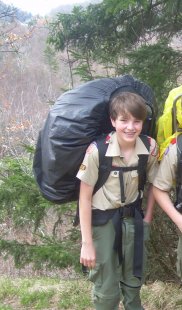
Environmental Protection and Conservation
 It is safe to say that my surroundings have had the greatest impact on my interests and how I ended up working as a policy intern at American Forests. I was born and raised in the mountains of western North Carolina, and this is where I call home. Living in the mountains has provided me with amazing opportunities, as breathtaking views, endless miles of trails and waterfalls are never more than a short drive away.
It is safe to say that my surroundings have had the greatest impact on my interests and how I ended up working as a policy intern at American Forests. I was born and raised in the mountains of western North Carolina, and this is where I call home. Living in the mountains has provided me with amazing opportunities, as breathtaking views, endless miles of trails and waterfalls are never more than a short drive away.
My childhood was centered on the outdoors, and being in the woods was second nature to me. Family vacations were always weekend camping trips with plenty of hiking, biking and canoeing during the day. While most kids wanted to go to an amusement park, my brother and I preferred a weekend out at Davidson River Campground finding swimming holes and trails to roam. However, I didn’t need a big weekend camping trip to get outdoors. The woods right in my own backyard were a playground where all the neighborhood kids played until the very last minute of daylight.
Nature is what I associate with friends and family.
Nature also played a role in other aspects of my childhood. I joined the Boy Scouts of America (BSA) at an early age, and it furthered my love of the outdoors through week-long summer camps and weekend backpacking trips. The BSA taught us how to plan and prepare for the unpredictability of nature, as well as how to treat the environment with respect and live with it, not just in it — Leave No Trace! As you can see, much of my free time has been spent in the forests of North Carolina, and I feel connected to that land more than anything.
It wasn’t until my environmental science classes in high school when I began to realize how many threats there are to the environment. It was overwhelming. Pollution, natural resource usage, land usage, fossil fuels, population growth, climate change, deforestation, urban sprawl and the list goes on. To think of how to solve these problems all at once is enough in itself to give someone a headache. Learning about these issues made me fearful for not only the future of the mountains I call home but for the environment, in general.
Protecting forests is essential in many aspects of environmental conservation efforts as trees provide ecological services that make life possible. Trees absorb carbon dioxide and polluted air and, in turn, release oxygen, as well as their role in naturally filtering water. By taking carbon dioxide out of the atmosphere, trees are critical in combating climate change and its effects. The destruction of forests hinders their natural ability to help keep the environmental healthy.
I believe that smart policy is one of the most effective ways to ensure a sustainable future and healthy environment. With the right policy in place and proper implementation, we can work to protect the forests that provide the invaluable resources necessary for life. By representing U.S. forests conservation interests, American Forests makes efficient and practical environmental legislation a primary concern. I am excited about my opportunity to work with American Forests as a policy intern this spring and the contributions I will be able to make to this organization and its numerous programs.
With more than 80 percent of Americans living in urban areas, society is becoming increasingly urbanized. So, more trees within our communities is becoming increasingly important. American Forests defines urban forests as “ecosystems of trees and other vegetation in and around communities that may consist of street and yard trees, vegetation within parks and along public rights of way and water systems.” Additionally, urban forests “provide communities with environmental, economic and social benefits and habitat for fish and wildlife.” American Forests’ Urban Forests and Community ReLeaf programs aim to raise awareness about the necessity of urban forests and provide resources to help cities understand and develop their urban forests.
As I start my semester of working with American Forests, I welcome you to get involved with this wonderful organization as we pursue the protection and conservation of the forests that provide the ecological services necessary for life.






















